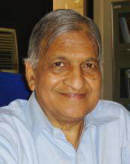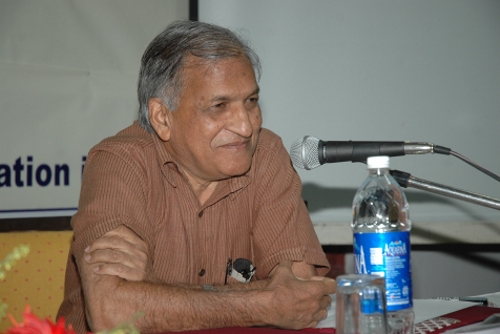

Theme Paper
for
3rd International Dialogue on Economics of Non-Violence: "Alternative Economics"
organized by
ICENS
Jaipur, Rajasthan, India
November 13-14, 2008
Search for an Alternative Model of Development
|
It has been accepted by most of the development - thinkers in the world that 'Sustainable Development' is a necessary condition for growth and development and this goal needs to be pursued vigorously by all the countries in future. Michael Spence's Growth Report: Strategies for Sustained Growth and Inclusive Development, 2008, is the latest addition to the literature on this subject. Dani Rodrik has critically examined the various issues related with economic growth in his famous book - One Economics, Many Recipes: Globalisation, Institution and Economic Growth, 2007. Inclusive growth reduces the development gaps between nations, regions, communities, individuals, economic sectors and technologies, but only sustained growth, which caters to the needs of the present as well as the future generations, can lead to durable and balanced growth for the peace and prosperity of mankind.
The world has experienced with models of 'Command Economies', 'Capitalist Economies', 'Mixed Economies', 'Neo-classical or liberal Economies', but rather than solving the problems of different countries, they have created more problems for them. It is now felt that there is something radically wrong with these models of growth, because the discontents and conflicts are increasing in the whole world in modern times. Globalisation of terrorism is increasing at a faster rate rather than the globalization of various economies of the world. Resources of the world in terms of land, water, minerals, forests, etc. are limited, they are getting depleted at a terrific rate. There is excessive use of global economic resources by countries like China, and some other developed countries of the world. Neo-classical model of development has helped countries like China and India to achieve high growth rates in recent years and in achieving some successes on the external front, such as accelerating export growth rates and accumulating large foreign exchange reserves, etc. But the problems of economic inequality and social tensions have increased under their liberalized regimes. Countries like India have to grapple with problems of poverty, unemployment, malnutrition, hunger, disease and backwardness in years to come. In fact, the problem of internal insecurity is to be tackled first, otherwise all efforts towards socio-economic transformation would come to naught in future.
Sustainable development model can provide lasting solution to the problems of both the developing and the developed countries. It is not confined to the sphere of economic change only, rather it includes under its ambit other spheres also; such as political, environmental, social, energy, technology, etc. A new term 'Triple Bottom Line (TBL) or 'People, Planet, Profit' has been coined for it, which, in essence, means social development (for the term people) (in terms of population stabilization and improvement in quality of life for all), environmental development (for planet) (in terms of reducing the remissions of GHGs and combating climate change) and economic development (for profit) (in terms of improving efficiency and equity in the economy). Thus, sustainable development ensures integrated development, because it is based on three Es, i.e. efficiency, equity and environment. But with the passage of time, to promote and strengthen sustainability, many more, Es, could be added to it, such as entrepreneurship, employment, entertainment, empowerment of dis-advantaged groups in society and enforcement of the laws and rules of the state. Each country should prepare its own roadmap of development, based on its culture, its stage of economic development, fiscal resources, political strength and aspirations of the people. It is pretty easier to ignite growth, but difficult to sustain it. Two-pronged effort is needed for growth: A short-run-strategy aimed at stimulating growth, and a medium-to-long run strategy aimed at sustaining growth (Dani Rodrik).
As indicated earlier, sustainable development requires holistic or systemic approach to growth. Reductionist approach of modern social scientists like economists, sociologists, historians, political scientists, etc. won't be helpful in this regard, because they mostly do not talk to each other, and do not feel the need to talk to each other. Most of them work on simplified assumptions which are often far removed from the realities of life. In fact, now, the time has come to consider the importance of some 'soft factors or elements', like honesty, discipline, hard work, sacrifice, humility, cooperation and compassion, etc. to solve multifarious human problems. They should not be ignored, simply because they are immeasurable, and, in some situations, clearly unidentifiable.
It has been felt that fractured, frictional and futile-type multi-party system and resultant coalition governments can't solve problems of highly populated countries like India. In fact, some sort of 'party planning' is more important than 'family planning' in such countries. There is a growing realization of this in India in more recent period, because China had successfully tackled both these problems, i.e. of party-planning as well as family-planning simultaneously. There is a single party rule and one-child norm for a family. Some political thinkers feel that Indo-Pakistan relations can become cordial on a lasting basis only. When Pakistan embraces secularism, democracy and diversity, and gives up theocracy, authoritarianism and orthodoxy, which are inimical to human relationships.
Even at the global level, there is need for a change of outlook of advanced industrialised countries like US & EU to enhance the sustainability of multilateralism under WTO. Even today, Doha Development Round (DDR), which was initiated in 2001, is in doldrums due to the pursuit of 'commercial interests' by the developed countries of the world in their dealings with the developing countries, and both types of countries do not adopt 'give and take' approach in right earnest, and therefore do not arrive at final positive results. Truly speaking, less-than-full-reciprocity (LTFR) concept is built into the WTO system, therefore, there should be lesser reduction in the tariff rates of developing countries, and more reductions, in that of developed countries, but the developed countries have not accepted this condition in actual practice so far. Similarly, with regard to civil nuclear deal between India and US, both the nations should have equal rights to protect their interests, such as 'India should have the right to test nuclear weapons, and US should have the right to react', even to the extent of cancelling the deal', if it goes against their interest. There must be full transparency and clarity in such matters, and there should be no politicking in these crucial deals and agreements. Nuclear Suppliers Group (NSG) of 45 countries has granted clean waiver to India so that all restrictions, on nuclear-trade with these countries have been removed. India's nuclear isolation has ended. Similar civil Nuclear Cooperation has been agreed upon with France and Russia also. This will promote the development of nuclear energy in India, and our energy self-reliance, strength and sustainability will be enhanced to a great extent in future.
Sustainable development demands zero-tolerance for corruption in every walk of life. There must be full cooperation between nations to fight floods, famines, earthquakes, hurricanes and storms, etc., to maintain in an effective manner the tempo and temper of sustainable development in the world. Instead of modern sophisticated technology which is unsustainable, and has high adverse impact on environment, there must be simple and sustainable technology so that environmental damage is minimized. Probably, nuclear or solar energy may be preferred to thermal energy, because the former is more environmentally-friendly and solar energy is renewable, but it needs a larger geographical space for generation of power.
Now the question arises as to whether the existing developmental models can lead us to the goal of sustainable growth in future, or some inputs of ethics, religion and spirituality can be supportive in this pursuit. Here, it has been felt by some leading thinkers that Jain philosophy and thinking can show us the right path towards sustainability and lead us towards a durable and peaceful social order. It affects consumption, production, and distribution patterns so that the emerging economic order guarantees the fulfilment of the basic needs of mankind, but does not give scope for satisfying the greed of the people. Let us see how it does all this. It is based on the noble teachings of Lord Mahavir, who emphasized the role of three values for peaceful co-existence of mankind, viz; freedom, equality and ethical behaviour - Jain philosophy emphasizes 'Anekant' (considering the views of others, and giving due respect to the view points of others) and Anu-vritas', i.e. observing certain rules of good conduct, such as not harming others in any form, to resort to limitation of desires and accumulations, etc. It lays emphasis on equanimity of mind and temper, which is essential for peace in society. Secondly, it emphasizes labour-absorbing and capital-saving decentralized development model in which people work largely in small units, free from problems of concentrated production in big units and free from exploitation of all types. There is little scope for environmental degradation and there is harmony between man and nature. There is compatibility between honesty and other aspects of human behaviour such as economic, political, administrative and cultural. In recent times, unfortunately, honesty has been put on the back-burner and it is considered incompatible with growth and development in society.
Acharya Mahapragya, a leading Jain saint, a spiritual visionary and an exponent of Jain philosophy, has emphasized the following pre-conditions for attaining the goal of a sustainable society:
- To turn towards vegetarianism from non-vegetarianism as far as possible, this will free a lot of land for agricultural production, particularly that of foodgrains for the teeming millions in a country.
- To shun the use of liquor, drugs, narcotics, various animal products from wild life and harmful luxurious products. One can start with more and more moderation in their use in the process of this change over to a better individual consumption pattern with due restraints.
- o resort to sharing and caring for others, rather than always accumulating more and more for oneself (Aparigraha), there must be limitation on possessiveness and accumulation of wealth, because that will reduce tensions and conflicts in society, and create enough space for building an equitable world social order.
- To prefer 'Anekant' (respect for the views of others), American President Barak Obama, in his famous historic speech, has expressed sentiments in support of 'Anekant', when he says "I shall discuss with you (American people), when we disagree". This is a very pious promise.
- To support the standard of life concept (simple living and high thinking) in preference to the standard of living concept (high living and no consideration at all for the level of thinking).
In the Ahimsa-tours of Acharya Mahapragya, and under his Ahima Training-Programmes, people have gradually moved towards better life, from violence to non-violence, from vices to virtues, from negative attitudes to positive attitudes, from non-vegetarianism to vegetarianism, from untruth to truth, from non-prohibition to prohibition and above all, from corruption to non-corruption. This is a great achievement in the present context of human affairs.
It is hoped that this sort of ethics-based development will be a real sustainable development, and lead us to a safer and more secure world. The time to make a final choice is here and now, otherwise never or nowhere. Let us rise to the occasion.
 Dr. Ashok Bapna
Dr. Ashok Bapna
